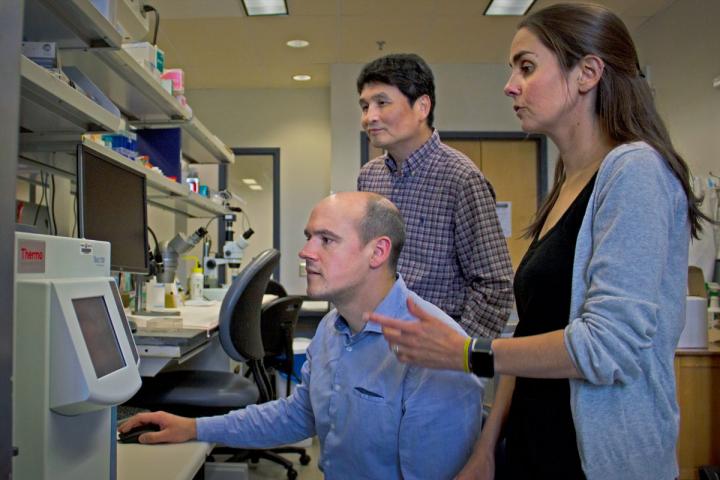
Credit: Virginia Tech
Mosquitoes may be small, but they are a formidable foe. Not only can they smell over 400 chemicals that we emit and detect the carbon dioxide we breathe out, but they can even adapt their daily behavior in response to our own.
With the help of a $2.7 million grant from the National Institute of Allergy and Infectious Diseases (NIAID), researchers at Virginia Tech are now investigating how mosquitoes adjust their olfactory, or smelling, rhythms in response to changes in our own daily activity.
“Mosquitoes are sometimes described as the deadliest animal on Earth,” said Clément Vinauger, principal investigator on the project and assistant professor from the Department of Biochemistry in the College of Agriculture and Life Sciences. “What we are seeing is an increase in the rate of mosquitoes that become resistant to insecticides and have some other level of behavioral resistance. We need another tool or other tools to control mosquito populations.”
VIDEO:https:/
Vinauger alongside assistant professor Chloé Lahondère and university distinguished professor Jake Tu, both from the Department of Biochemistry in the College of Agriculture and Life Sciences and affiliated faculty members of the Center for Emerging, Zoonotic, and Arthropod-borne Pathogens, an arm of the Fralin Life Sciences Institute, received the grant to support a five-year project to study mosquito’s biological timing, or chronobiology.
The research will look at the molecular and cellular levels of the mosquito brain to find what allows mosquitoes to adapt and finetune their biological rhythms.
“Mosquitoes have rhythms, exactly like us,” said Lahondère, who is also an affiliated faculty member of Fralin’s Global Change Center. “We are very active during the day and then we go to sleep. For mosquitoes, we don’t know a lot about their biological rhythm, so we are trying to understand how they process information at different times of the day and what is going on in their brain.”
The specific mosquito species being studied is Aedes aegypti, a primary vector for Zika, dengue, and yellow fever. These invasive mosquitoes prefer to feed on people and live throughout the Southern United States, including Virgina.
With a more urbanized environment and a changing climate, the ranges of these mosquitoes and other mosquito species could expand over the coming years. Adding to that, large populations of mosquitoes are becoming both physiologically resistant to insecticides and behaviorally resistant to other control methods like bed nets.
“With climate change, there is a potential impact on mosquitoes’ geographic distribution,” Lahondère said. “As temperatures are rising, mosquitoes can move north, and that exposes people to the potential diseases that they can transmit.”
Mosquitoes are resilient beings. No matter how many showers we may take, mosquitoes can still smell and find us. As found by Vinauger and Lahondère’s past research, mosquitoes can remember host smells and effectively track their victims.
To be the most efficient bloodsuckers on earth, mosquitoes also need to be active most when they can find a meal the easiest. That time is usually when we are most vulnerable and easy to access, which often aligns with our daily activities and circadian rhythms.
Mosquitoes also experience biological rhythms with their sense of smell. At one stage of the day, they reach a low point in odor sensitivity that eventually rises to a smelling peak. Their ability to detect and process host odors then declines, just as our senses decline late at night.
The more in tune their rhythm is with our availability as hosts, the more mosquitoes can feed and the more disease is spread.
Understanding what molecular and cellular processes underpin these rhythms could prove crucial in the fight against mosquitoes that cause disease outbreaks.
“What we are proposing here is to try to understand how mosquitoes keep out-smarting our control strategies,” said Vinauger, who is also an affiliated faculty member of the Fralin Life Sciences Institute and Center for Emerging, Zoonotic, and Arthropod-borne Pathogens. “How do they synchronize to a new human environment or the fact that their host is available only at certain times compared to others?”
Using miniature mosquito-helmets that track brain activity in a virtual reality setting, the team of researchers will be able to determine how mosquitoes modulate their olfactory rhythms and their behavioral rhythms in response to host cues.
The research will also investigate how circadian clocks control mosquitoes’ brain and antenna activity by “knocking out” the gene that controls a mosquito’s sense of time, effectively creating an arrhythmic, mutant mosquito.
Put together with single-cell sequencing of the mosquito brain, the researchers will be able to identify where and what molecules or cells control how mosquitoes synchronize their rhythms with ours.
“If we can better understand how they work, we can have a better set of tools to use for their control,” Lahondère said. “Understanding why they bite and how they process information at a specific time of the day can lead to finding key information for mosquito control.”
As mosquitoes become more resistant to insecticides and spread at a rapid rate, finding new targets to disrupt their feeding habits is all the more important.
Through this NIH’s NIAID grant, Vinauger and his team are hoping to find any rhythmic targets that mosquito control professionals can exploit. All it takes is finding out just what makes a mosquito tick.
###
– Written by Tyler Harris
Media Contact
Kristin Rose Jutras
[email protected]
Original Source
https:/




